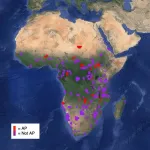(Press-News.org) MIAMI, FLORIDA (July 25, 2024) – Many people with stage II or III colon cancer receive additional, or adjuvant, chemotherapy following surgery. However, clinical trials have shown that this treatment doesn’t improve the chances of survival for every patient. A study published July 25 in Cell Reports Medicine identifies and validates a 10-gene biomarker that potentially predicts whether a stage II or III colon cancer patient will benefit from adjuvant chemotherapy.
A secondary finding from the study could also lead to further research and application. Researchers found that the gene signature could potentially also predict whether immunotherapy would help some patients – important because there are not yet clear guidelines on which colon cancer patients might benefit from immunotherapy.
The study, led by Steven Chen, Ph.D., a researcher at the Sylvester Comprehensive Cancer Center at the University of Miami Miller School of Medicine, lays the foundation for further research that could someday allow patients and their doctors to make personalized treatment decisions.
“When you’re talking about precision oncology, it means you use an individual patient’s information — here we are particularly talking about biomarkers from the patient — to guide the doctor in making a clinical decision about what kind of treatment is best for the patient,” Chen said. “Ideally, we only want to apply adjuvant chemotherapy to the patients who will benefit from it. For patients who don’t respond, we still need to find other effective treatments.”
As a data scientist, Chen applies machine learning and artificial intelligence to cancer research, primarily focusing on colorectal and breast cancer.
Scientists have previously found biomarkers that help doctors predict a patient’s survival curve or understand how aggressive a cancer is. These are useful, Chen said, but don’t help guide treatment.
So, he and collaborators at Vanderbilt University and Memorial Sloan Kettering Cancer Center set out to find a gene signature — a specific set of genes whose combined expression patterns can serve as a biomarker — that could.
Colon cancer patients’ tumors have many different genomic profiles, so the team aggregated gene expression profiles from six publicly available sources to create a 933-patient data set, making it one of the largest gene expression datasets for stage 2 and 3 colon cancer.
The team’s data scientists meticulously curated and performed quality control to ensure they could identify an accurate gene signature for predicting responses to chemotherapy.
They also wanted the gene signature to be practical, with a small number of genes. They used machine learning to build a network of thousands of potentially relevant genes, which they narrowed down first to an 18-gene network and then to 10 genes.
Once they were confident the 10-gene network was biologically relevant, they built a model that analyzes the gene signature to predict which patients would benefit from adjuvant chemotherapy.
Next, the team wanted to test their gene signature’s accuracy. Having an interdisciplinary team was crucial to this step, Chen said. “Working closely with surgeons, oncologists and biologists ensures that our findings are robust, clinically relevant and can be effectively translated into practice.”
The team’s data scientists tested the gene signature’s predictive power by comparing it to results from thousands of random five- to 15-gene networks. It was dramatically better at predicting whether a patient would benefit from chemotherapy.
The surgeons and oncologists collected tumor tissue samples from 109 stage 2 and 3 colon cancer patients, along with information about the patients’ responses to adjuvant chemotherapy.
Tests using these samples further verified the model: Patients predicted to benefit from chemotherapy based on the gene signature “had significantly better survival outcomes than those predicted not to benefit,” the study found.
Chen hopes the team’s biomarker will be used to help patients someday, but several more steps are needed before it can be used clinically.
“To be really clinically applicable, we need to go through prospective clinical trials,” he said. “It means we recruit patients and apply this biomarker to see if it’s really effective.”
The study was supported by funding from Sylvester and was motivated by Chen’s goal of translating data science into real-world benefits.
“I hope every research finding we discover can improve clinical decisions and eventually help cancer patients,” he said.
about Sylvester’s research on the InventUM Blog and follow @SylvesterCancer on X for the latest news on its research and care.
# # #
Title: Discovery and validation of a 10-gene predictive signature for response to adjuvant chemotherapy in stage II and III colon cancer
DOI: doi.org/10.1016/j.xcrm.2024.101661
Funding and Author Information: Available in the online article.
END
New research to be presented at this year’s Annual Meeting of the European Association for the Study of Diabetes (EASD) (Madrid, 9-13 September) shows that a child is almost twice as likely to develop type 1 diabetes (T1D) if their father has the condition, than if their mother has the condition.
The study, the largest of its kind, suggests that exposure to T1D in the womb confers long-term protection against the condition in children with affected mothers relative to those with affected fathers.
Understanding what is responsible for this relative protection could lead to opportunities ...
CORVALLIS, Oregon – Oregon State University researchers have made the first scientific confirmation in Puget Sound of two distinct shark species, one of them critically endangered.
The presence of the broadnose sevengill shark and endangered soupfin shark in the sound, the southern portion of the Salish Sea, may indicate changes in what biologists in OSU’s Big Fish Lab describe as an economically, culturally and ecologically valuable inland waterway.
The Salish Sea separates northwest Washington from British Columbia’s Vancouver Island. The ...
CAMBRIDGE, MA — It is estimated that about 70 percent of the energy generated worldwide ends up as waste heat.
If scientists could better predict how heat moves through semiconductors and insulators, they could design more efficient power generation systems. However, the thermal properties of materials can be exceedingly difficult to model.
The trouble comes from phonons, which are subatomic particles that carry heat. Some of a material’s thermal properties depend on a measurement called the phonon ...
CAMBRIDGE, MA – Organizations are increasingly utilizing machine-learning models to allocate scarce resources or opportunities. For instance, such models can help companies screen resumes to choose job interview candidates or aid hospitals in ranking kidney transplant patients based on their likelihood of survival.
When deploying a model, users typically strive to ensure its predictions are fair by reducing bias. This often involves techniques like adjusting the features a model uses to make decisions or calibrating the scores it generates.
However, researchers from MIT and Northeastern University argue that these fairness ...
Dr. Wencai Liu, an associate professor of mathematics at Texas A&M University, has been selected to receive the 2024 International Union of Pure and Applied Physics (IUPAP) Early Career Scientist Prize in Mathematical Physics in recognition of his exceptional achievements and future potential in mathematical physics.
Liu is one of three scientists worldwide honored with the prize, one of 19 celebrating the contributions of early career physicists within the subfields of each commission comprising the IUPAP, which was founded in 1976 to promote research in mathematical physics. Each prize consists of a certificate, medal and a monetary award.
Liu ...
(Santa Barbara, Calif.) — There’s an experiment going on in conservation in Africa. With biodiversity imperiled, and nations facing financial and political crises, some governments are transferring the management of protected areas to private, non-governmental organizations (NGOs).
This strategy seems to be paying off. NGOs can better manage corruption, making them attractive to large donors like the World Bank and European Union. Their capital can fund personnel, research and technology to more effectively manage protected areas and species. While these management changes appear ...
FOR IMMEDIATE RELEASE
Media Contact: Elizabeth.Fernandez@ucsf.edu, (415) 502-6397
Subscribe to UCSF News
Study Finds Big Disparities in Stroke Services Across the U.S.
Low-income communities are up to 42% less likely to obtain stroke center certification.
Hospitals in poor communities are significantly less likely to obtain certification for stroke services, which makes them unable to provide urgent, lifesaving treatment, UC San Francisco researchers are reporting in a 14-year study of the nation’s hospitals.
By ...
Interest in urban ecology is growing rapidly as cities expand and the need to understand urban ecosystems becomes more pressing. The Ecological Society of America’s upcoming Annual Meeting in Long Beach, Calif., Aug. 4–9, features a diverse array of talks and posters dedicated to this dynamic field.
Researchers from around the world will present their latest findings on how urban environments impact biodiversity, ecosystem services and human well-being. In addition to a Symposium devoted to the urban ecology of Greater Los Angeles, dozens of talks and posters will offer valuable insights ...
July 26, 2024
Contact: Kate McAlpine, 734-647-7087, kmca@umich.edu; Nicole Casal Moore, 734-709-1651, ncmoore@umich.edu; Phillip Kisubika, 217-244-7448, pkk18@illinois.edu
Image
ANN ARBOR—He has honed the power of plasma to advance semiconductor processing, high-quality thin films for magnetic hard drives, and fusion energy. For these and other accomplishments, University of Illinois Professor David Neil Ruzic has been chosen to receive the 2024 University of Michigan Prize for Excellence in Plasma Science and Engineering.
Ruzic is the Abel Bliss Professor of Engineering in ...
UPTON, N.Y. — Scientists from the U.S. Department of Energy’s (DOE) Brookhaven National Laboratory have created the first-ever atomic movies showing how atoms rearrange locally within a quantum material as it transitions from an insulator to a metal. With the help of these movies, the researchers discovered a new material phase that settles a yearslong scientific debate and could facilitate the design of new transitioning materials with commercial applications.
This research, recently published in Nature Materials, marks a methodological achievement; the researchers demonstrated that a materials characterization technique called atomic pair distribution ...





